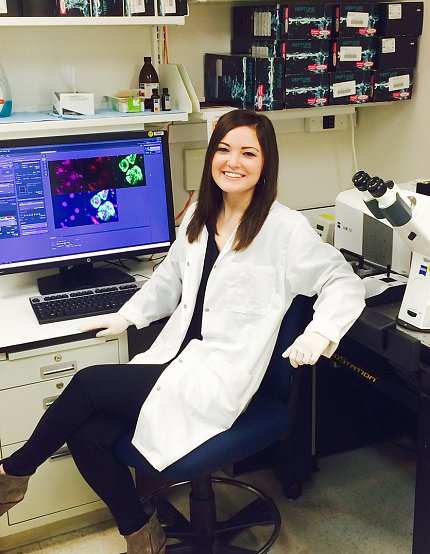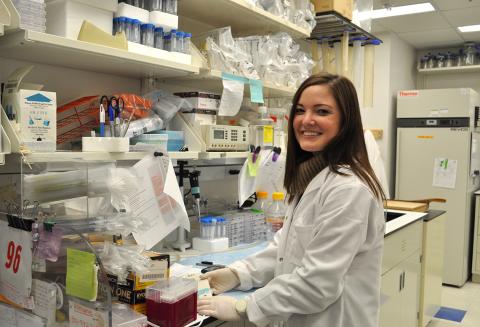‘Rare Bird’ Set to Soar
Cancer Survivor Gives Back as Researcher, Future Physical Therapist

Photo: Ross Lake
Lauren Stahl ignored the bump on her arm for a long time. After all, she was 18, a senior in high school, focused on important stuff like college applications. But the knot near her left elbow, sitting right on the funny bone, kept bothering her. It became painful. After a few months, she visited her doctor, who scheduled a procedure to remove what everyone thought was just a cyst. But Stahl had a bad feeling it was something more. She was right. She was diagnosed with stage 1 spindle cell sarcoma, a very rare soft tissue cancer.
Despite the life-altering medical news, Stahl graduated from high school and enrolled in community college. One month into classes, she underwent two surgeries and radiation therapy and received a good prognosis. Life got back to normal…sort of.
“I had really changed,” she explained. “Having cancer, at my age…the experience of being in the hospital, having radiation treatments made me realize how blessed I was. In my oncologist’s office, I was always the youngest patient. And this cancer I had, nobody had ever seen before. I never met anyone else who had it. They were always calling me ‘the rare bird.’ I started to wonder how other people—those who had to have chemo or those with more serious cancers—managed to get through it all. I just felt that I had to help others have hope and see the light at the end of the tunnel. I had this tremendous need to give back in some way.”
A few months ago, Stahl, a post-baccalaureate researcher in the Laboratory of Genitourinary Cancer Pathogenesis at NCI’s Center for Cancer Research, began a blog, “Scars Create Stars,” to reach out to other cancer survivors.
“What I really wanted to convey,” she wrote in her first post, “was that whatever your scar(s) might be, it doesn’t have to defeat or define you. Scars are just a part of your story. And whatever those scars might be, you can use them to propel you forward and to make a difference in the lives of those around you.”
This was just Stahl’s latest move to translate her passion into practice. Before cancer, she’d planned on a career in psychology and counseling and was pursuing such courses in college. After her treatments, she decided she wanted to be a cancer researcher and eventually go into medicine. Always an above -average student, she switched her major to biology and earned a generous scholarship to Georgetown University. She immediately looked into cancer labs there and attempted to join a prestigious program studying sarcomas. But she encountered a rather significant obstacle: Dr. Jeffrey Toretsky rarely accepted undergraduates into his research program.
“But I was really persistent,” Stahl said, smiling. “I read papers and studied everything the lab was doing for 2 years.” Toretsky, himself an ex-NCI fellow under former Pediatric Oncology Branch chief Dr. Lee Helman, consented and became Stahl’s mentor.

Photo: Carla Garnett
“I had accepted undergraduates before Lauren, but due to the time commitment and emotional maturity required for lab work, I have a very high bar to accept undergraduates into the lab,” said Toretsky, principal investigator of an NIH-funded lab studying Ewing sarcoma and co-leader of the Molecular Oncology Program at the Lombardi Comprehensive Cancer Center. “Lauren was incredibly persistent, but in a kind way, in order to join our lab group. Once on the team, she was the kind of member that would take on any task that would benefit the mission of the lab, and do it well.”
After graduating from Georgetown, Stahl considered taking a gap year before going into medical school. One year wasn’t enough research experience for her; she wanted to learn more. Stahl was offered a post at NIH. She’s now just about finished the first half of a potential 2-year NCI postbac stint studying drug targets for prostate cancer. Still, she’s raring to make more of a difference. Wanting to balance research with teaching and patient care, she decided to apply for study in a physical therapy program.
“I’ll still get to work with kids and cancer patients,” Stahl said. “I’m really passionate about helping people use their experience with cancer to motivate themselves, to drive themselves in ways they never thought they could.”
She’s also determined to lead by example. In addition to her blog, which is already affiliated with Stupid Cancer—the largest charity for young adult cancer—she ran her first marathon for St. Jude’s Children’s Research Hospital on Mar. 12. Her survivor story is featured on the American Association for Cancer Research Foundation’s web site.
February marked Stahl’s 5-year survivor anniversary. That meant the 23-year-old had to face a new battery of PET and CT scans to make sure she was cancer-free.
“I had flashbacks entering the hospital again,” she recalled. “Pieces of my past experience, the fears, all came back. I mean, I was 95 percent confident that the cancer was gone, but that other 5 percent can be crippling. The uncertainty can overwhelm you, until you get the all-clear.”
“N-E-D—no evidence of disease.” That’s actually the only term any survivor wants to hear after completing the periodic monitoring. Have studying tumors first hand, working at NIH and learning more about the disease than the typical person with cancer made Stahl’s experience as a patient more or less nerve-wracking?
“Well, in many ways, it’s a lot more calming and reassuring having worked with a lot of dedicated researchers who are really devoted to finding new treatments and therapies,” she said. “The other side is realizing that there are more than 200 types of cancer, so there’s never going to be ‘a cure for cancer.’ The goal is to find therapies to reduce the harsh side effects of chemo and other treatments…When you’re going through cancer, it’s scary. I can say that from my own personal experience. If I can help someone else through it, if I can share my own positive outlook, then I’ll feel like that was the reason I got through it.”
You can find her blog at https://scarscreatestars.wordpress.com/.
